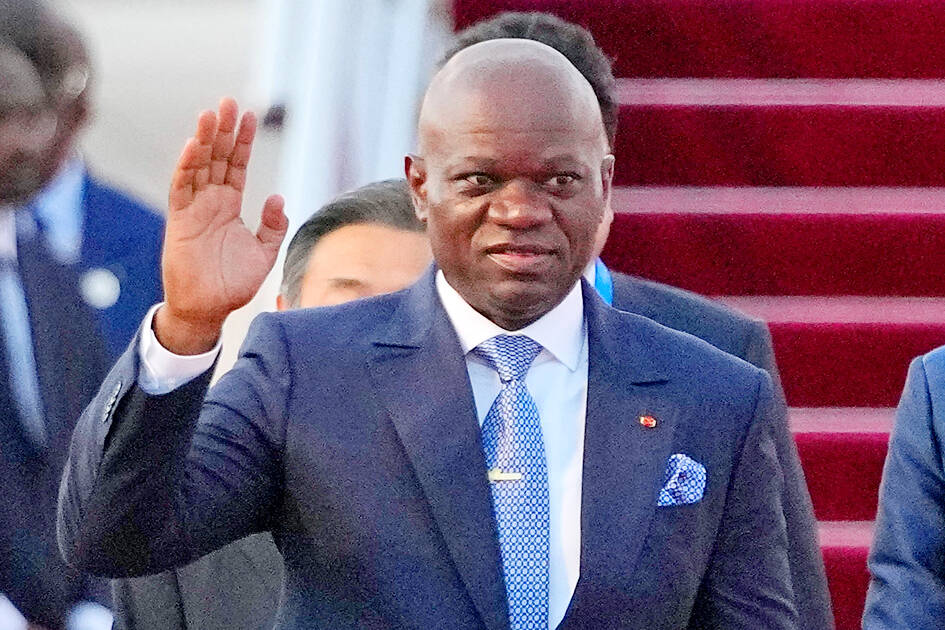Gabon’s president-elect Brice Oligui Nguema, 50, who led a coup ending decades of Bongo family rule and swept polls last month with nearly 95 percent of the vote, was to be sworn in yesterday.
The general and former junta leader, who toppled Ali Bongo in August 2023, ending 55 years of dynastic rule by the Bongo family, officially takes the presidential reins after leading a 19-month transition government.
Several African heads of state were expected to attend the inauguration, including Gambian President Adama Barrow, Senegalese President Bassirou Diomaye Faye, Djiboutian President Ismail Omar Guelleh, Equatorial Guinea President Teodoro Obiang Nguema Mbasogo, Democratic Republic of the Congo (DR Congo) President Felix Tshisekedi and Rwandan President Paul Kagame.

Photo: AP
Kigali and Kinshasa are currently in talks to end fighting in eastern DR Congo. Tickets were free to attend the investiture at the Angondje stadium, built to honor friendship between Gabon and China, and it would be the first time the country holds a swearing-in ceremony in front of such a large audience.
The event was to have artistic performances, a military parade and a “victory concert” on the Libreville waterfront in the evening, state media had said. In the lead-up, hundreds of workers have been painstakingly cleaning and repainting areas around the main roads leading to the stadium.
Authorities and official media have called for people to be public-spirited in view of the influx of foreign guests.
“All citizens of Greater Libreville are asked to extend a warm welcome to these distinguished guests,” the Gabonese Ministry of Interior said in a statement.
It also called on residents near the stadium to “take part in cleaning and beautifying” the area.
Oligui faces serious challenges in leading the oil-rich country, which needs to revamp crucial infrastructure and diversify its economy, but is heavily indebted.
Among the main concerns are an aging electricity network which has frequent power cuts, youth unemployment that hovers at 40 percent, poor or lacking roads and a ballooning public debt, which is forecast to hit 80 percent of GDP this year.
During the transition, Oligui portrayed himself as a “builder,” launching numerous construction projects while vowing to “crack down” on corruption to get the country back on track.

VAGUE: The criteria of the amnesty remain unclear, but it would cover political violence from 1999 to today, and those convicted of murder or drug trafficking would not qualify Venezuelan Acting President Delcy Rodriguez on Friday announced an amnesty bill that could lead to the release of hundreds of prisoners, including opposition leaders, journalists and human rights activists detained for political reasons. The measure had long been sought by the US-backed opposition. It is the latest concession Rodriguez has made since taking the reins of the country on Jan. 3 after the brazen seizure of then-Venezuelan president Nicolas Maduro. Rodriguez told a gathering of justices, magistrates, ministers, military brass and other government leaders that the ruling party-controlled Venezuelan National Assembly would take up the bill with urgency. Rodriguez also announced the shutdown

Civil society leaders and members of a left-wing coalition yesterday filed impeachment complaints against Philippine Vice President Sara Duterte, restarting a process sidelined by the Supreme Court last year. Both cases accuse Duterte of misusing public funds during her term as education secretary, while one revives allegations that she threatened to assassinate former ally Philippine President Ferdinand Marcos Jr. The filings come on the same day that a committee in the House of Representatives was to begin hearings into impeachment complaints against Marcos, accused of corruption tied to a spiraling scandal over bogus flood control projects. Under the constitution, an impeachment by the

Exiled Tibetans began a unique global election yesterday for a government representing a homeland many have never seen, as part of a democratic exercise voters say carries great weight. From red-robed Buddhist monks in the snowy Himalayas, to political exiles in megacities across South Asia, to refugees in Australia, Europe and North America, voting takes place in 27 countries — but not China. “Elections ... show that the struggle for Tibet’s freedom and independence continues from generation to generation,” said candidate Gyaltsen Chokye, 33, who is based in the Indian hill-town of Dharamsala, headquarters of the government-in-exile, the Central Tibetan Administration (CTA). It

China executed 11 people linked to Myanmar criminal gangs, including “key members” of telecom scam operations, state media reported yesterday, as Beijing toughens its response to the sprawling, transnational industry. Fraud compounds where scammers lure Internet users into fake romantic relationships and cryptocurrency investments have flourished across Southeast Asia, including in Myanmar. Initially largely targeting Chinese speakers, the criminal groups behind the compounds have expanded operations into multiple languages to steal from victims around the world. Those conducting the scams are sometimes willing con artists, and other times trafficked foreign nationals forced to work. In the past few years, Beijing has stepped up cooperation